
Darkwood Dub was a Serbian alternative rock band formed in Belgrade in 1988. In the years after the formation the band gradually grew to prominence on the Serbian rock scene, eventually becoming one of the most notable acts of the 1990s and 2000s Serbian and regional scene. Their music spawned many different genres. It was characterized by a mixture of live drumming and electronic percussion with frequent use of slide guitar, synthesizers and samplers and succinct and introspective lyrics, sung with offbeat vocals of Dejan Vučetić. The band cooperated with a number of musicians—most notably prominent jazz musicians Vasil Hadžimanov and Bisera Veletanlić—and composed scores for several films and theatre plays. The group released eight studio albums before disbanding in 2017.

Disciplin A Kitschme, originally known as Disciplina Kičme, was a Serbian and Yugoslav and, for a period of time, British rock band, formed in Belgrade in 1981. The band was noted for their unique and energetic sound, with bass guitar as the primary instrument and drawing inspiration from punk rock, funk, blues, jazz fusion, Motown, rap, the works of Jimi Hendrix, Yugoslav 1970s progressive and hard rock bands, and in the later phases of their career from jungle and drum and bass.

Električni Orgazam is a Serbian rock band from Belgrade. Originally starting as a combination of new wave, punk rock and post-punk, the band later slowly changed their style, becoming a mainstream rock act. They were one of the most notable acts of the former Yugoslav rock scene.

Riblja Čorba is a Serbian and former Yugoslav rock band formed in Belgrade in 1978. The band was one of the most popular and most influential acts of the Yugoslav rock scene.
Kraljevski Apartman is a Serbian heavy metal band from Belgrade. The band rose to prominence during the late 1990s and early 2000s, becoming one of the most popular bands on the Serbian heavy metal scene.
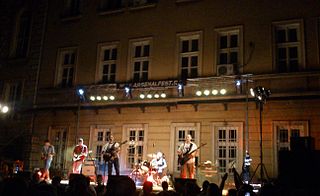
Babe is a Serbian rock band formed in Belgrade in 1992.

Goblini are a Serbian punk rock band from Šabac.
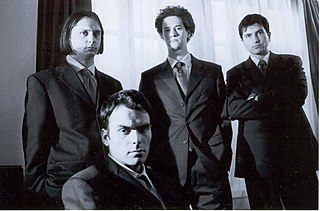
Presing is a Serbian alternative rock band from Belgrade. Formed in 1990 and named after pressure defense in basketball, Presing were, together with Darkwood Dub and Kanda, Kodža i Nebojša, representatives of the so-called NeoBeo sound, alternative, guitar-based rock music produced in Belgrade in the early 1990s. New York Press wrote about Presing: "It's a sound that kicks the pants off the recycle-rock of The Strokes, The Vines and the White Stripes, just to name a few... You can hear bits of the melodic era of The Fall, some Nick Cave, some Neil Young–and even some P-Funk via Kraftwerk".
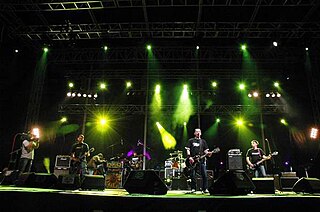
Čovek Bez Sluha is a Serbian punk rock band from Kragujevac.
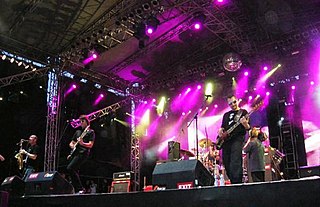
Plejboj is a Serbian rock band from Belgrade.

Novembar is a Serbian punk rock band from Niš.
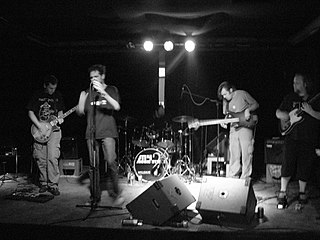
Kanda, Kodža i Nebojša is a Serbian alternative rock band from Belgrade.
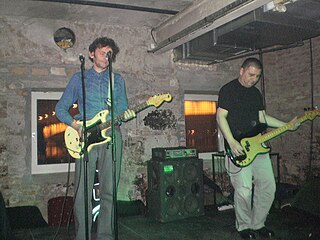
Supernaut is a Serbian alternative rock band from Belgrade.

Repetitor is a Serbian alternative rock band from Belgrade.

Jarboli is a Serbian alternative rock band from Belgrade.
Lutke is a Serbian power pop band from Belgrade.

Del Arno Band is a Serbian and Yugoslav reggae band formed in Belgrade in 1986. Del Arno Band are one of the pioneers of Serbian and Yugoslav reggae scenes and are considered the longest-lasting reggae band of former Yugoslavia.

Goribor is a Serbian alternative rock band from Bor. Having performed as a teenage band called Projekat from 1988 until 1992, after a four-year hiatus, the band was reformed in 1996 by the founding members, the vocalist Aleksandar Stojković "St" and guitarist Željko Ljubić "Pity" with the guitarist Predrag Marković "Peđa". Until 2003 they had been making home-made demo recordings eventually released through the Croatian independent record label Slušaj Najglasnije!, after being discovered by the head of the label Zdenko Franjić.

Du Du A was a Serbian and Yugoslav alternative rock band formed in Belgrade in 1981.
Nežni Dalibor are a Serbian alternative rock band from Vranje and one of the most notable acts of the New Serbian Scene.

















